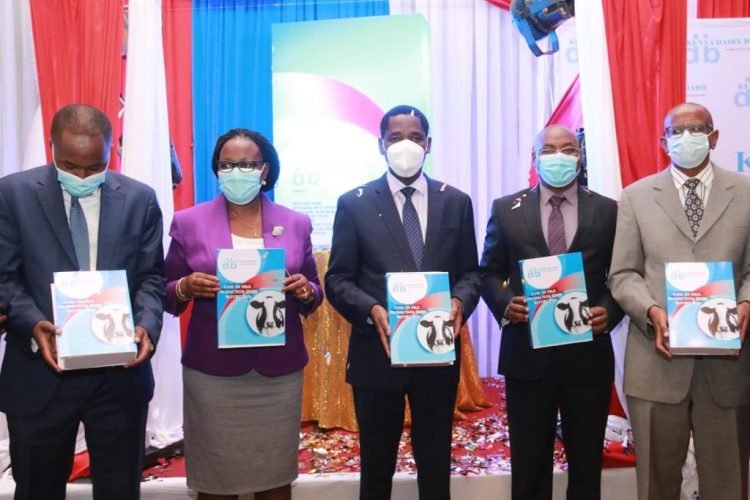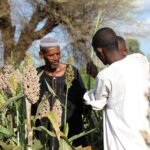By Murimi Gitari, June 14, 2021
The Cabinet Secretary, Ministry of Agriculture, Livestock, Fisheries and Cooperatives, Peter Munya, has called upon the youth, farmers and potential investors to invest more on dairy farming as it is a promising profitable enterprise.
Speaking during the launch of the cost of milk production report 2021, the CS noted the dairy industry in Kenya has impressive statistics that underline its significance in contributing to socio-economic development in the country.
“The annual production of milk in 2019 was estimated at 5.5 billion litres of milk, a growth of 12% from the 4.9 billion litres produced in 2018 and the country’s milk production in 2019 was approximately 11% of the 49.9 billion litres of milk produced in Africa,”Munya said.
Munya said that these figures indicate a growing market for milk and milk products in the country as the consumption of milk per capita in the country is 110 litres per person by year. This is projected to grow to 130 litres per person per year by 2030.
“From the findings of this report, the dairy sector is profitable as on average, a dairy farmer in 2019 earned milk profits of KSh 12.20 per litre compared to KSh 4.20 in 2014,”he added.
The CS also acknowledged the challenges faced by the sector and especially the farmers who are constrained by herd feeding which increases the cost of milk production.
“I would urge farmers instead of investing in many cows, have few ones that will give you a manageable productivity for every cow.”
He said the ministry in is the process of coming up with a law that will be looking at fertilizer and animal feeds which has been identified as a gap for the sector. They will operationalize a board that will be a regulator and oversee that animal feed processors sell feeds that are of value to consumers’ money.
“We are developing a framework as a ministry on how people can access idle government land and provide them with incentives where they can produce quality feeds for animals,” the CS said.
The report shows the need to manage the costs of feeding and labour in milk production systems in the improvement of productivity and management of costs. The CS assured the stakeholders who attended the launch that the government was exploring public-private partnerships for large scale production, conservation, and distribution of fodder and pastures. This was expected to reduce cost and improve accessibility of fodder and feed in the country.
“The Kenyan dairy industry must rise and face the threats posed by increasing globalization and regionalization of markets. This can only be possible if we clearly identify and provide solutions to the challenges affecting productivity and efficiency in the dairy value chain.”Munya said
Overall, the report indicates high operational costs and inefficiencies under small scale milk production systems. A gradual transformation to more intensive medium to large scale milk production systems is required to improve efficiency in milk production with Munya saying this can be achieved through private, public and communal investments in milk production.
“The Government is promoting the uptake of labour saving technologies such as chaff cutters and milking machines by dairy farmers through capacity building and provision of credit facilities by Agricultural Finance Corporation, Banks, and other financial service providers.”
He mentioned that such equipment are required by dairy farmers to manage operational costs and the county governments can intervene to help farmers.
The Kenya Dairy Board Managing Director, Margret Kibogy, urged all stakeholders in the dairy value chain to be in compliance with the regulations that were put in place early this year saying if the industry is well organized, profits would be realized at every single value chain.
The study done in 20 selected counties was conducted by Tegemeo Institute of Agricultural Policy and Development, contracted by the Kenya Dairy Board and had the objectives of estimating the cost of milk production and profitability in Kenya, to establish the factors that contribute to the cost of milk production and to identify interventions required to manage the cost of producing milk in the country.
In related news, the government of Kenya has requested Tanzania to remove the veterinary fees of TSh 2,000 per kilogram (approximately KSh 95) imposed on Kenyan milk exported to Tanzania. This is expected to facilitate milk exports, especially UHT milk, which was seriously affected by the introduction of the fees.
By noting that research is a continuous exercise, the CS said the ministry will continue to periodically undertake similar studies to keep stakeholders well informed on topical issues in the dairy value chain. This will improve planning and decision making on policy and other operational areas relevant to the sector.
The launch was also attended by the Permanent Secretary, Department of Livestock Mr Harry Kimtai and the Kenya Dairy Board Chairman Anthony Ian Njoroge Mutai who commended the board and the research institute for the study.







